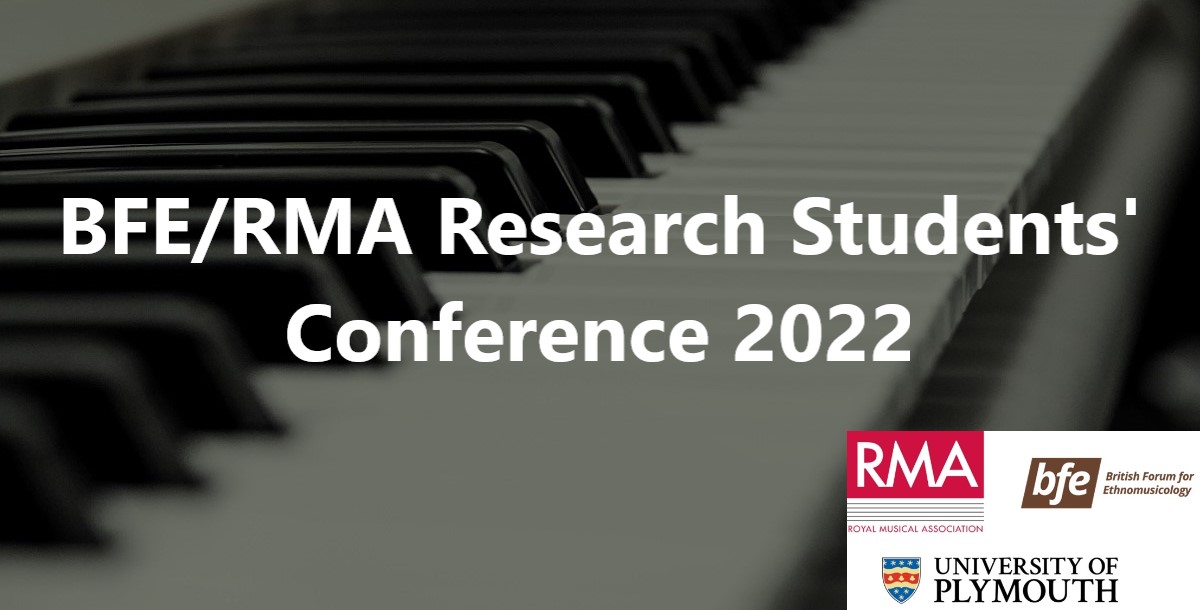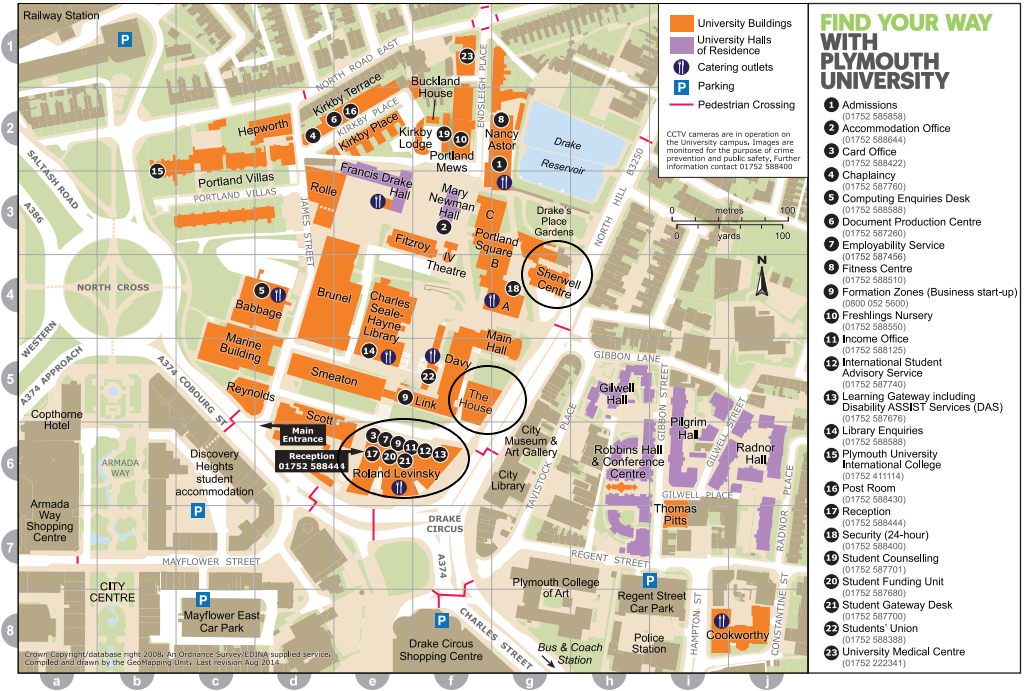
6 to 8 January, 2022 at University of Plymouth
The School of Society and Culture at the University of Plymouth is delighted to host the British Forum for Ethnomusicology and Royal Musical Association Research Students’ Conference from 6 to 8 January, 2022. The Research Students Conference is an excellent opportunity for PhD students to gain valuable presentation experience in a friendly and welcoming environment, amongst peers and established academics.
Email: rsc2022@plymouth.ac.uk
Programme
Keynote Speakers
Amada Hsieh: Chinese University of Hong Kong
Winner of the Jerome Roche Prize, on behalf of the RMA.
Lyndsey Copeland: University of Toronto
Winner of the BFE Early Career Prize, on behalf of the BFE
Important Dates
Submission deadline: 1 October 2021, 23:59 GMT
Notification of acceptance: 19th October 2021
Conference Date: 6 to 8 January, 2022
Registration
Accomodation
- One Caprera Guesthouse (North Road East, 5-minute walk) - £50
- Gallery Guesthouse (North Road East, 5-minute walk) - £60
- Jury’s Inn (Exeter Street, 7-minute walk) - £40-£60
- Copthorne Hotel (Armada Way, 5-minute walk) - £40-£60
- Travelodge (Derry’s Cross, 14-minute walk) - £35-£40
- Premier Inn (Derry’s Cross, 14-minute walk) - £40
- George Guest House (Citadel Road, 17-minute walk) - £50
- New Continental Hotel (Millbay Road, 18-minute walk) - £70
- Premier Inn (Lockyer’s Quay, 20-minute walk) - £40
For Airbnb, look for these areas: Greenbank, Mutley, Mannamead, Hoe, Barbican, City Centre, Lipson, St Judes.
Venue & Travel
Plymouth is a vibrant ocean city. It is accessible by rail, coach, car, or ferry. BFE/RMA research student conference will be hosted in the Roland Levinsky Building, House building and Sherwell Centre. The building locations are circled in the below map.

A campus map can be viewed and downloaded here.
Air links
Nearby airports include Bristol, Exeter, and (via Rail links) the major London airports (Heathrow, Gatwick, Luton, and London City).
The train station is just a few minutes’ walk from the city centre and main University campus at Plymouth, where BFE/RMA research student conference will be held. There is a regular train service from Plymouth to London Paddington which takes around three hours. This is the best service to connect with if you are travelling to BFE/RMA research student conference via one of the London airports.
There are other direct services from Plymouth to South Wales, the Midlands, the North of England and Scotland. Train is the quickest and most convenient transport, but can be very expensive, depending when you travel.
Air and Rail
From Exeter there are several trains to Plymouth in most hours.
From Bristol there are several train per hour.
From London Paddington there is one inter-city train per hour (note that the train that leaves around 1700 is always expensive), and there are some trains from London Waterloo, but the journey is longer than from Paddington, and you will have to change trains at Exeter. The most convenient way of crossing London is by tube. If you book a train from an airport to Plymouth via London, it should include the necessary Tube fare. If you are flying to Heathrow or Gatwick there are also specialist express trains which will take you from the airport to Paddington very efficiently (15 minutes from Heathrow to Paddington, 30 minutes from Gatwick to Paddington) - though fares for these services can be high.
For rail enquiries, call +448457484950 or visit www.nationalrail.co.uk or www.thetrainline.com.
Ferry
Brittany Ferries operate car ferry services between Roscoff (France) and Santander (Spain) and Plymouth. Fares can be high, especially in season, but are charged by the vehicle, so for a group sharing a car it can be a good deal (with no further travelling necessary in the UK). Visit www.brittany-ferries.com
There are other ferry services from France to ports further East (Weymouth, Poole, Portsmouth, Dover), but there are no direct highway connections with Plymouth, so you need to allow ample travelling time. Operators include P&O, AFerry.co.uk and DFDS Seaways.
Car
The main route to Plymouth from the North is via the M5 motorway and then continuing on the A38 Expressway via Exeter. Leave the A38 at March Mills interchange and take the A374, which is clearly signed for the City Centre. From the West, leave the A38 at Manadon Interchange and take the A386 into the city. It’s about a three and a half hour journey from London to Plymouth.
In keeping with the University’s environmental commitment, the use of cars by students, other than students with disabilities, is actively discouraged. In line with good environmental practice, the University charges for car parking on campus. Parking on campus is severely restricted, however, if visiting us, please contact the BFE/RMA research student conference committee to enquire regarding visitor parking, on your behalf. Alternative parking can be found in the city centre. There are several car parks located within walking distance of the University.
A full list of car parks and their locations can be found on the Plymouth City Council website.
The city centre also provides three park and ride facilities at George Junction (the largest capacity of the three), Milehouse and Coypool, running services Monday to Saturday. For further information please visit the Park and Ride section of the There are regular coach services from most major cities to Plymouth. The coach service from Bretonside Bus Station in Plymouth to London Victoria goes via Exeter and takes just four-and-a-half hours. The bus station is a few minutes’ walk from the city centre and main University campus. National Express is the main coach operator from London airports to Plymouth: coach is inevitably slower but usually a lot cheaper than train. If you are really needing to count the pennies, Megabus (including Megatrain) may be a possibility. Plymouth City Council website.
Coach
For coach enquiries, call +448705808080 or visit www.nationalexpress.com For Megabus and Megatrain enquiries, visit www.megabus.com/uk/
Calls
The deadline for calls has passed.
Call for Papers and Lecture-Recitals
Postgraduate research students are invited to submit proposals in the following formats:
- 20-minute individual paper
- 30-minute lecture recital
Individual proposals should consist of a title, an abstract of no more than 250 words and a short biography of no more than 100 words. Please submit them through the application portal, which will also require the following information: name, email address, institutional affiliation, programme of study and year, and technical requirements (if any).
For lecture-recitals, a Yamaha grand piano will be available. Please note that there is strictly no playing inside or preparing the piano allowed.
Call for Panels
90-minute panel (three 20-minute papers and 30 minutes of discussion)
If proposing a panel, please provide a title and an abstract of no more than 250 words and a biography of no more than 100 for each contribution to the session, following the above guidelines. An additional 250-word rationale is required, that makes clear the purpose of the session, its theme, and the ways in which the individual contributions relate to each other. Please indicate whether an independent chair will be required.
Call for Posters
Postgraduate taught (e.g. MA, MMus, etc.) and research students (e.g. PhD, MPhil, MRes, etc.) are invited to submit proposals for a poster on their original research. There will be a poster competition with prizes including Cambridge University Press book vouchers. The winning and runner-up posters will be featured on the RMA Student Blog. Poster proposals should include a title and a 250-word abstract and a biography of no more than 100 words. Please submit them through the application portal, which will also require the following information: name, email address, institutional affiliation, programme of study and year, and technical requirements (if any).
Note that it will be the delegates’ responsibility to print their own poster. We can advise on local printers.
Call for Compositions
Compositions by postgraduate taught and research students are invited for The Hermes Experiment (soprano, clarinet, harp, double bass). They may be a movement or excerpt of a larger work (up to 5 minutes long). Selected composition will be workshopped by the Hermes Experiment.
Submission Guidelines: Compositions should be submitted in PDF format accompanied by a brief text of no more than 250 words outlining poetic and technical aspects of the piece, and a biography of no more than 100 words. The text should be submitted through the application portal. Please also provide the following information when submitting your proposal through the application portal: name, email address, institutional affiliation, programme of study, year of composition. A PDF of the score should be submitted to rsc2022@plymouth.ac.uk.
Composers whose works are selected will be responsible for producing performing materials at their own expense, and these will need to be available by the end of November.
Call for Electroacoustic Compositions
Electroacoustic compositions (no more than 10 minutes) by postgraduate and research students are invited for performance over a diffusion system. Electroacoustic pieces including acoustic instruments are possible if you arrange for your own performers and instruments. Pieces will be workshopped by Professor Eduardo Miranda and performed live during an electroacoustic composition session at the conference.
Submission Guidelines: Pieces should be accompanied by a brief text of no more than 250 words outlining poetic and technical aspects of the piece. The text and a link to the composition file (e.g. Dropbox, Google Drive, etc.) should be submitted through the application portal. Please also provide the following information when submitting your proposal through the application portal: name, email address, institutional affiliation, programme of study, year of composition.
Electroacoustic compositions should be submitted at 44.1kHz sampling rate. Multi-channel works are permitted, but due to performance restrictions, must not require more than 8 channels. Multi-channel submissions should be a stereo downmix; full multi-channel will be requested upon acceptance.
Code of Conduct
The BFE and RMA are committed to delivering harassment-free conferences for everyone, regardless of sex, gender identity and expression, sexual orientation, disability, physical appearance, race, age, disciplinary affiliation, or religion or belief. We do not tolerate harassment of conference participants in any form. Conference participants violating these rules may be sanctioned or expelled from the conference at the discretion of conference organisers, and in accordance with the relevant policies of the host institution (with additional consequences for BFE/RMA membership at the discretion of the BFE Committee or RMA Council).
Harassment includes offensive verbal comments related to sex, gender identity and expression, sexual orientation, disability, physical appearance, body size, race, age, disciplinary affiliation, or religion or belief. It also includes intimidation, stalking, following, harassing photography or recording, sustained disruption of talks or other events, inappropriate physical contact, and unwelcome sexual attention.
Note that what is said online (for example on social media and blogs) is just as real as what is said and done in person at the conference. Note also that we expect participants to follow these rules at all conference venues and conference-related social events.
Participants asked to stop any harassing behaviour are expected to comply immediately.
If a participant engages in harassing behaviour, conference organisers may take any action they deem appropriate, including warning the offender or asking them to leave.
If you are being harassed, notice that someone else is being harassed, or have other concerns, please contact a conference organiser or a designated assistant, who will be happy to contact university/college security or police, to arrange for an escort, or otherwise help participants feel safe for the duration of the event.
This policy is based on the LIBER 2015 Code of Conduct, which is in turn based on the conference anti-harassment policy on the Geek Feminism Wiki.
The BFE/RMA Conference Code of Conduct can be viewed and downloaded as a PDF here.